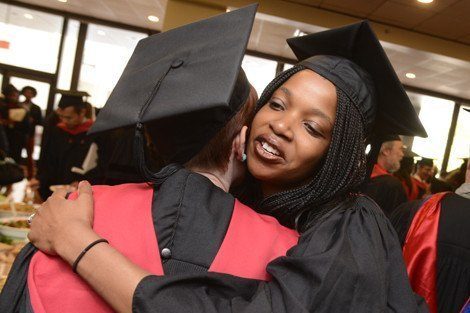May 29, 2014 — It’s not always comfortable being a person committed to what others see as an impossible goal, Harvard School of Public Health (HSPH) Dean Julio Frenk told graduates at the School’s 2014 Commencement Ceremony.
He spoke from experience. When Frenk was Mexico’s Minister of Health from 2000 to 2006 and attempting what some thought was “impossible”—expanding health coverage to all citizens—he accidentally saw an email from a high-ranking colleague that said, in essence, “The Minister has lost his marbles. How does he think he can insure those 50 million people?” 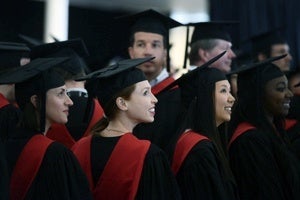
But the ambitious goal was achieved: Today, Mexico’s universal coverage program, Seguro Popular, covers 58 million people—“my colleague’s doubts notwithstanding,” Frenk said.
The dean urged the graduates—who have the unique distinction of being members of HSPH’s Centennial graduating class—to do their own “impossible” work: “nothing less than changing the world.”
At the Commencement ceremony, held on a sunny afternoon before a crowd in a tent in Kresge courtyard, 537 degrees were awarded: 33 Doctors of Philosophy, 56 Doctors of Science, 264 Masters of Public Health, 176 Masters of Science, and 8 Masters of Arts. Graduates came from 63 countries and from 43 U.S. states. Fifty-eight percent of the graduates were women. At a festive reception the evening before Commencement, awards were presented to 23 students, seven faculty, and two staff members.
The work yet to be done
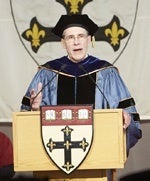
Since 1913, when the Harvard-MIT School for Health Officers, as the School was then known, opened its doors, there have been world-changing public health advances that at first seemed impossible to achieve, Frenk said. He cited the eradication of smallpox; the conversion of HIV/AIDS from an automatic death sentence to, increasingly, a treatable chronic condition; reductions in toxic air pollution; and burgeoning global interest in universal health coverage—all advances in which HSPH research, faculty, or alumni have played key roles.
As the School moves into its second century, Frenk said there are four urgent global health threats that must be tamed: killer diseases and pandemics, harmful physical and social environments, poverty and humanitarian crises, and failing health systems.
Frenk recalled the tragic death last September of 33-year-old Elif Yavuz, who received her doctorate from HSPH in May 2013. Elif was weeks away from delivering her first child when she and her partner were among 69 killed in a terrorist attack on a Kenyan shopping mall. “As we mourn the senseless loss of this bright light, let us use it as an inspiration to recommit to doing all we can to create a better healthier world,” Frenk said.
He added, “I cannot imagine a group more well-equipped to tackle this challenge—and make the impossible possible.”
‘At the forefront of the nation’s public health movement’
The Commencement address was given by Tom Frieden, Director of the U.S. Centers for Disease Control and Prevention. In his introduction, Frenk said that during Frieden’s eight years as New York City’s health commissioner, he helped put the city “at the forefront of the nation’s public health movement” by requiring restaurants to post calorie counts and by instituting targeted bans on trans-fats and smoking, which helped pave the way for reforms around the country. Frenk presented Frieden with the 2014 Julius B. Richmond Award—the highest honor given by HSPH.
Read more about Tom Frieden and the Richmond Award
Congratulating graduates on being members of HSPH’s Centennial class, Frieden noted that the major public health issues of 100 years ago—widespread preventable diseases and widespread health disparities—remain the cardinal imperatives of the field. “Let’s hope a commencement speaker 100 years from now doesn’t say the same thing,” Frieden said.
‘Asking the hard questions’
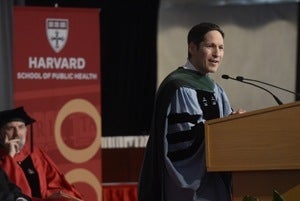
Frieden cautioned graduates not to “fall into a trap of self-righteousness” while doing work that it’s natural to feel good about. “Overconfidence can kill,” he said. “It’s so important to recognize the limitations of our knowledge and recognize that whatever we accomplish is accomplished because of the work we do with others.”
He added, “Humility is a critically important attribute—not just because it’s nice to have—but because it’s important to be effective.”
He gave examples from his own career to show how asking hard questions and being humble in the face of tough answers can yield better public health results.
Running a New York City tuberculosis control program in the mid-1990s for the CDC, during an outbreak of multidrug-resistant TB, Frieden instituted a number of improvements that he was proud of, he told the graduates. But when a visiting colleague asked if he knew how many tuberculosis patients had been cured, “I didn’t know and I was horribly ashamed,” Frieden recalled. “It was a single hard question that changed my life.” After that, Frieden focused more on how patients fared over the long term. The new efforts eventually led to a 90% cure rate.
A decade later, as New York City’s health commissioner, Frieden oversaw increased tobacco taxes and new workplace smoking bans. “We saw smoking rates go down steadily for the first time in a decade, and I thought our work was done,” he said. But, remembering the lesson he’d learned from his tuberculosis work, Frieden had put a system in place to track smoking rates—which made clear that, over time, smoking rates were inching back up. Having good data helped Frieden and his colleagues implement new programs that helped push the rates back down.
“It’s important not to be afraid of asking the hard questions, even if—or especially if—you’re afraid of what the answer might be,” Frieden said.
Frieden also spoke of the importance of effective communication. He recalled working in the rural Mississippi Delta area at a health clinic where few people were coming in for doctor visits. A community survey revealed that 50% of the local population didn’t even know the clinic existed. Eighty percent didn’t know it had a sliding fee scale. And those who did know were less likely to use the clinic than those who didn’t. The lesson: “You need to know whether you’re reaching people,” Frieden said.
‘Tear up health problems by the roots’
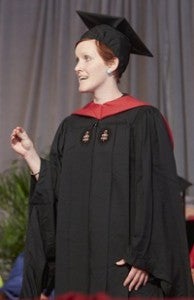
Student speaker Jacqueline Murdoch, who earned an MPH in the Department of Social and Behavioral Sciences, told her fellow graduates that she hadn’t planned on a career in public health. Ten years ago, she was studying math and planning a career in technology. Then she was raped.
In the difficult months that followed, she said, her doctor provided valuable support—and she decided to become a doctor too, to help others through their darkest times. But after she began practicing medicine, she discovered many others who, like her, had been brutalized. One night, tending to a woman badly beaten by her husband—the third battered woman she’d seen that night—she realized she wanted to do more than “be on the patching up end of health.” She wanted to combat what she realized was a systemic problem—“to work to stop the violence from happening in the first place,” she said.
HSPH, she said, has helped many achieve similar goals that focus on prevention. Thomas Weller, Richard Pearson Strong Professor of Tropical Public Health and chair of the department from 1954 to 1981, conducted research that helped pave the way for the polio vaccine—and today’s near-worldwide eradication of the disease—and earned him the Nobel Prize. The efforts of alumnus Donald Hopkins, MPH ’70, have helped reduce the number of cases of guinea worm, a horribly painful condition, from 3.5 million in 1986 to just 600 last year. HSPH faculty were among the first to demonstrate the dangers of secondhand smoke, which led to legislation banning smoking in many public places.
“Class of 2014—we will be eradicators too,” said Murdoch. “Through our deliberate efforts, we will tear up health problems by the roots. We will get rid of them entirely.”
Alumni greetings
Anthony Dias, MPH ’04, president of the HSPH Alumni Association, delivered alumni greetings. Dias is vice president at the Connecticut Hospital Association, where he provides strategic leadership on the design of analytic innovations and new services for hospitals in Connecticut in in other states. As a physician executive, Dias works at the intersection of clinical medicine, informatics, management, and public health, on issues such as quality of care and patient safety, regulatory and reimbursement practices, community health and disparities, and the use of data to drive clinical performance.
“As you venture forth to innovate, lead, contribute and reform public health, let us remind ourselves that our alumni continue to lead in a tradition of phenomenal contributions and achievements in the field of public health,” Dias told the graduates. “You are now stepping into that tradition and you symbolize all those who came before you and all those yet to follow.” He added, “Today, as you join the fold, our alumni are ready to support you as you embark on your career path.”
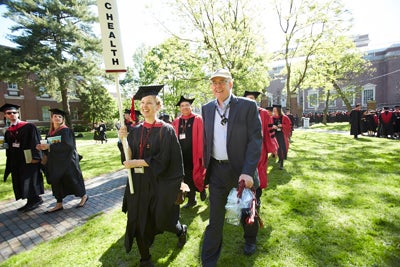
photos: Kent Dayton and Tony Rinaldo
Additional Coverage
Centennial closing symposium
Award winners
Webcast: HSPH Commencement Ceremony 2014
Commencement Eve Celebration photo gallery
Commencement 2014 photo gallery
Commencement 2014 slideshow
CDC Director Tom Frieden address
Dean Julio Frenk address
Student speaker Jacqueline Murdoch address
Alumni Association President Anthony Dias address
